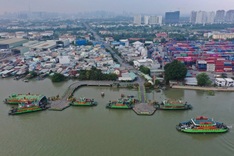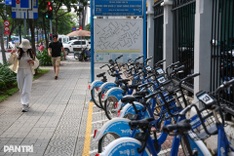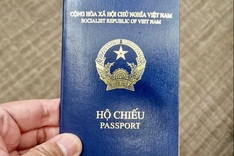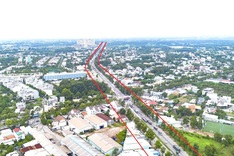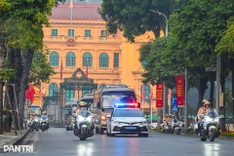In part 9 of a series on Ho Chi Minh, Laura Lam reveals his steadfast demands and persistant persuit of independence for his people.
>>Part 1: Paris, my two worlds
>>Part 2: A journey in search of freedom
>>Part 3: Nguyen the Patriot
>>Part 4: Indochina and little emperors
>>Part 5: The rise of patriotism
>>Part 6: Finding a compass
>>Part 7: Young Ho Chi Minh with Grand Chef Escoffier
>>Part 8: Young Ho Chi Minh in America
It was early September, 1919. Paris was still having summertime weather. Nguyen Ai Quoc would have walked from his apartment near the Odéon through Place St. Sulpice, past the Bon Marché store, to the Ministry of the Colonies in the 7th district. At the entrance, Quoc went through a security check. He then entered an impressive iron gate and walked past a yard laid with cobblestones. Inside the ancient building, he met a large man dressed in a black suit with long coat tails, who quietly accompanied him to Albert Sarraut’s office. Sarraut had recently returned to France. While in Indochina as Governor-General for the second term, he had earned the nickname “the hangman”. He would soon become the new Minister for the Colonies.
 |
| Albert Sarraut in Le Journal du Peuple, Paris |
Sarraut’s new office was spacious, with a prominent display of precious objects from Asia. Now in his 50’s, he was wearing a monocle on his right eye. Sitting behind a huge desk, he looked uncompromising. Upon seeing the fragile looking Annamite, Sarraut stood up and greeted him. At this first encounter, the former Governor-General wanted to identify the author of the petition for Viet Nam’s independence. He asked Quoc many questions out of curiosity. When Quoc presented his case and reasoning in a determined manner, Sarraut appeared impressed and he made a number of promises. The next day Quoc wrote to him:
“To follow up our talk yesterday, I am sending you a copy of the Demands. As you were so kind to tell me that you were disposed to talk frankly, I am asking you to indicate to us what has already been accomplished regarding our Eight Demands…The eight questions continue to be unresolved. None has yet received a satisfactory solution. Please accept, Mr. Governor-General, the assurance of my profound respect.”
That same week, Quoc published an article in Le Populaire about the fates of the 97,903 Indochinese youths drafted by force into labor battalions during the First World War. They had been used extensively at the front, and most never returned. He wanted to know where they were, alive or dead. The shipment of these youths to Europe in 1916 had stirred up much resentment among the Vietnamese public. Emperor Duy Tan took the opportunity to mobilize a national uprising. It was brutally crushed down and the emperor was sent into exile in Réunion.
In the early summer of 1920, Quoc was asked to return to the Ministry of the Colonies, for another interrogation with Sarraut. He was annoyed and decided to delay his visit to the Ministry until some weeks later. One day, he revealed his frustration to a man who tried to befriend him, whom he suspected was spying on him:
“Why did they censor all my mail? Recently I wrote to a French author. Four days later I received an answer, not from the author but from the Minister for the Colonies, Albert Sarraut. The letter was signed by Monsieur Guesde. I was puzzled as why the Minister was answering my letter. M. Guesde asked me to come to his office for a meeting. But I haven’t responded to his request.”
The day Quoc arrived at the Ministry of the Colonies, Mr. Guesde had already left for a summer holiday. Another official, named Pasquier, asked Quoc if he could help. When Quoc mentioned his petition, Pasquier wasn’t interested and changed the subject.
In early 1921, Quoc was told to meet Albert Sarraut again. Paris was in the middle of a very cold winter. Quoc always disliked wearing heavy winter clothes. However, he would have dressed well for the meeting, and warmly for the season, typically with a bowler hat, a thick woolen scarf, and a dark overcoat. At his encounter with Sarraut this time, the new Minister for the Colonies was polite, while trying to persuade Quoc, “If France is returned to you, you won’t be able to govern it yourself, because your country is not sufficiently well armed”. Quoc told him the Annamites had a long history and they were perfectly capable of governing their own country. Not winning the argument, Sarraut changed his tactics and attempted to bribe Quoc by offering him an attractive position with very generous benefits. But that effort failed.
In June 1922, Quoc was instructed to see Albert Sarraut for another interrogation. As soon as he entered Sarraut’s office, he found the Minister in an agitated mood. This encounter was filled with intimidation and manipulation:
“Nowadays there are lunatics in France, who are very active. They have a close relationship with the Bolsheviks. From Russia they communicate with Guangdong. From Guangdong they communicate with Viet Nam. The French government knows all of these. They are conspirators who wish to disturb the peace and security in Indochina, and they work against the Mother country that protects them. The Mother country is very generous but will not let loose those rebels…”
“I like brave young men like you. It’s good to have bravery, but one must be abreast of the issue to be considered intelligent. Hey! If you ever need my help, I will be ready to assist you. From now on we know each other, there is no need to be so formal.”
Quoc remained calm and responded with his usual politeness, “The main thing in my life and what I need the most is freedom for my compatriots. May I go now?”
In early 1923, Albert Sarraut recommended the deportation of Quoc to Viet Nam for imprisonment. However, the Governor-General of Indochina disagreed. He thought the best solution was to keep Quoc far away from his own people, in order to minimize his influence on them and their influence on him.
Over a long political career lasting beyond Dien Bien Phu, including two periods as President of the Council of Ministers, Albert Sarraut would have time to learn an old truth: that the repression of ideas and principles that are right, and of the people carrying them, does not work.
Nguyen Ai Quoc was a man of vision. His mission was to liberate his own people and those of other suppressed nations, and the world’s map would be re-drawn by him.







